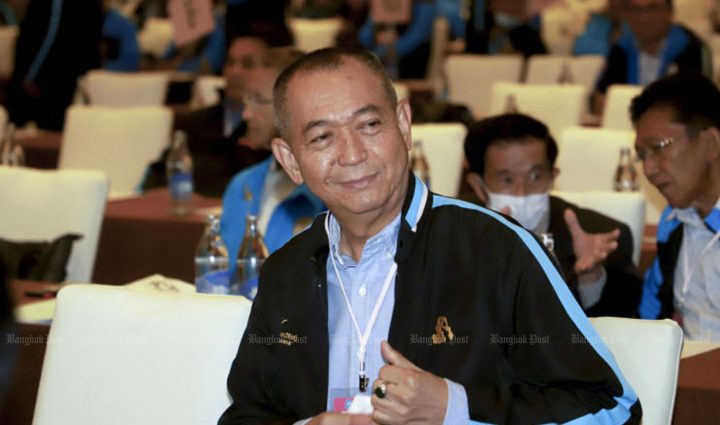Former agriculture minister says he’s ready to answer any questions about smuggling case

Democrat Party leader Chalermchai Sri-on has denied reports that businessman Li Shengjiao, wanted in connection with a major pork smuggling scandal, is his half brother.
Mr Chalermchai, a former agriculture minister in the Prayut Chan-o-cha government, was responding on Friday to reports that tried to link him to Mr Li, one of four suspects being pursued by the Department of Special Investigation.
The Criminal Court approved arrest warrants based on evidence gathered by the DSI to support charges of tax evasion, Customs Act violations related to the import of animals and carcasses, money laundering and related offences, Pol Maj Gen Nathapol Ditsayatham, head investigator on the case, said on Thursday.
The three others named in the warrants were Yang Ya Sung, Mr Li’s son Karin Piyapornpaiboon, and Nawaporn Chaowai, who was in charge of accounting for Mr Li.
Earlier, the DSI had interrogated four key witnesses involved in the smuggling of more than 10,000 shipping containers of pork worth about 6-7 billion baht.
On Thursday, DSI officers raided five locations in Bangkok, including private shipping and cold-storage facilities, to seize evidence.
Mr Li reportedly left Thailand on Dec 30.
There have been reports that Mr Li, or “Hia Kao” (Brother Kao) is a half brother of a well-known politician.
Responding to the reports, Mr Chalermchai said: “My father lived in Thailand for over 80 years (after coming from China) and never returned to China. How did he father a child in China?”
Thais of Chinese descent and their relatives in China can run businesses in Thailand, he said. Anyone who committed wrongdoing must face legal action, said Mr Chalermchai.
He also denied knowing anything about Mr Li’s house. He said he had neither visited Mr Li’s home nor business premises.
He acknowledged that he had been seen with Mr Li because he had been invited to attend an event at a hotel. There were many businessmen and civil servants present, he explained.
DSI officers who searched Mr Li’s home this week found many framed pictures of him with well-known public figures including politicians and senior police officers.
Mr Li’s son Karin shares the same surname as Wirat Piyapornpaiboon, who is Mr Chalermchai’s elder brother, and his nephew Jakphan Piyapornpaiboon, a Democrat MP for Prachuap Khiri Khan.
The Democrat leader said he knew only that a request had been sought to use the surname, but he did not know any details about the matter.
He also insisted that he had neither acted to favour any persons nor received any dirty money, saying he hated corruption.
“Anyone who commits wrongdoing, no matter whether they are my relatives or my close aides, must face punishment. I never protect people. Let’s speak the truth. Don’t try to link it to politics. It’s useless,” said Mr Chalermchai.
He expressed confidence that he could explain any questions put to him. When serving as agriculture minister, he said, he had ordered the Livestock Department chief to get tough on pork smuggling.
Large-scale smuggling of pork has caused prices to collapse in the domestic market, hurting the incomes of pig farmers across the country.
A local shortage that began in 2022 after an outbreak of African swine fever prompted some companies to illegally import pork to cash in on high demand.
The seizure of 161 shipping containers holding 4,025 tonnes of pork at Laem Chabang Port in mid-2023 showed the huge scale of the operation and led to the DSI investigation.
Ministry of Agriculture officials believe the illegal shipments originated from supermarkets in Brazil and some countries in Europe, where regulations require frozen meat to be destroyed after a year in storage.
Instead of being destroyed, the “expired” pork was shipped to be sold in developing countries, including Thailand.

